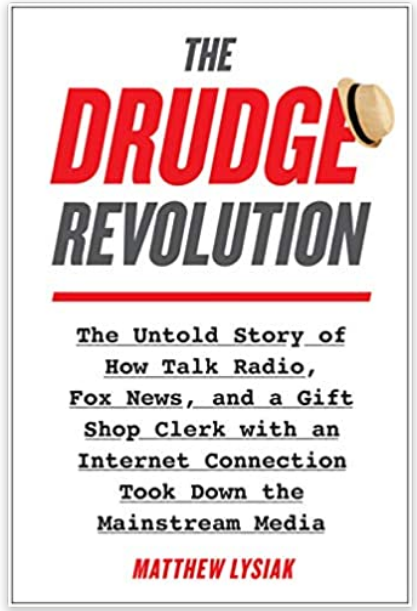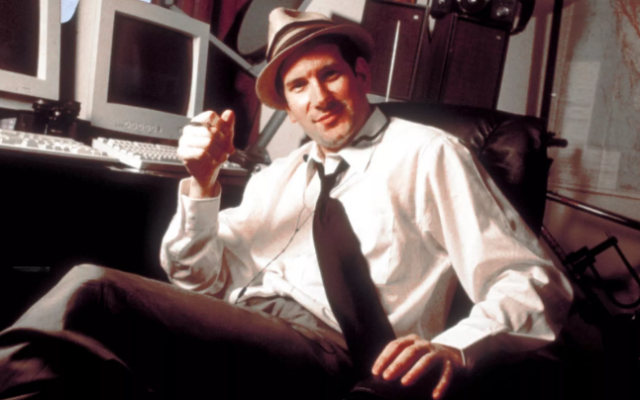New Book Looks Behind ‘The Drudge Revolution’
Investigative reporter conducted 200 interviews to provide picture of reclusive Jewish journalist.
In January 1998 Matt Drudge was a largely obscure innovator trying to develop an alternative internet new site called the Drudge Report. That changed literally overnight when Drudge learned that Newsweek magazine decided not to publish a story about an alleged affair between a young White House intern, Monica Lewinsky, and President Bill Clinton. Drudge published the story with the headline, “Newsweek Kills Story on White House Intern: 23-Year-Old, Sex Relationship with President” and journalism was never the same again.
Drudge once advised Alex Jones, the sensationalist internet media host, not to back down from controversy. “You’re playing in Google’s hell pit,” he told Jones in 2015, “Make your own place. … I live in a world that is free, colorful, vibrant, takes chances, bold, stands up to power. And that’s where I’ve made my success.”
Last year the Drudge Report claimed to have had 10 billion page views, which is generally credited to be accurate, and Drudge, both of whose parents were Jewish, had become a political kingmaker.

A new book by Matthew Lysiak, a former investigative reporter for the New York Daily News, explores the life and legend of the 53-year-old Drudge, who ironically has remained a very private celebrity. I spoke to Lysiak recently about his book, “The Drudge Revolution.”
AJT: Who is Matt Drudge?
Lysiak: I would say that in our generation, there isn’t a single individual who’s had more of an impact on the way we consume information than Matt Drudge. He rose from absolute obscurity and usurped the entire media establishment of a generation that was decades in the making.
I feel like Matt’s kind of the godfather of the whole internet news revolution that we live in today; we’re all sort of in his shadow. But he doesn’t really get the credit he deserves for that. With this book, I wanted to bring that out.
AJT: You have spent a lot of time doing basic research on Drudge’s childhood. He was born to Jewish parent who divorced when Drudge was quite young. Does Drudge today acknowledge his Jewish roots?
Lysiak: He frequently travels to Tel Aviv and what’s interesting is that for someone who rarely does anything public, he went on Twitter about how Fox News was covered a recent synagogue shooting. They appeared to be smiling while discussing it. He went on Twitter, very upset and called them out. So he feels a deep connection to his Jewish heritage. It isn’t something he dismisses. It’s a part of Matt. To what extent I’m not exactly sure.
AJT: As you point out, Drudge just barely graduated from high school and had a history of psychological problems growing up. How did he succeed so spectacularly?
Lysiak: Matt’s ability to identify a story above and beyond anything else, to me, is key. He’s able to look into a story written by say the Associated Press and find that really interesting nugget that might be buried in paragraph 12 and highlight it on his website. And he was an innovator. You know, it’s so easy now to think, oh, he’s an internet news guy. Well, when Matt began, he was just about the only internet news guy.
AJT: How did he change journalism?
Lysiak: I’m 42. When I was a kid, there was ABC, NBC, CBS and a few really very influential newspapers that sort of dictated the news that the American public had access to. When Matt posted the Monica Lewinsky story, it transformed the entire media landscape because from that moment forward editors weren’t given the luxury of being gatekeepers. He was a wrecking ball that smashed right through them all. And rarely in history do I think you could pinpoint the exact moment when that occurs.
Later he gave a speech to the Washington Press Club and he talked about the future. He looked at all these established journalists and he told them, look, you guys are obsolete.
In the future, he said, there’s going to be thousands and thousands of journalists reporting on their own through the internet. And I think that largely came true. But it’s good and bad. It’s a double-edged sword.
AJT: Some critics have characterized the internet as similar to the wild west in the movies, where hate speech on social media is dangerously out of control. What do you think?
Lysiak: It is the wild west for media, but that puts a lot of onus and personal responsibility on the consumer. What’s the alternative exactly? Is it a government commission? How would that work? At the end of the day, we’re all just people making decisions and the media is not some independent monster. It’s a reflection of our desires. We get the media we deserve.




comments